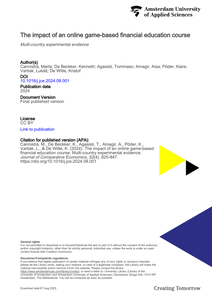Dit rapport beschrijft de resultaten van een onderzoek naar online veiligheid en mediawijsheid onder 1432 jongeren uit het voortgezet en het middelbaar beroepsonderwijs in Leeuwarden. Het biedt een cijfermatig inzicht in online problemen: welke problemen komen voor en in welke mate? Met de via de tool ( Online Tool Internetveiligheid 2.0.) verkregen data zijn zowel analyses op gemeentelijk niveau als op schoolniveau gemaakt. In het verlengde hiervan kunnen preventiestrategieën op maat worden ontwikkeld. Uiteindelijk doel is het veiliger maken van het internet voor jongeren. Dit onderzoeksproject is uitgevoerd vanuit de cross-over Digital Citizenship: dit is een samenwerkingsverband tussen de onderzoeksgroep Cybersafety en het lectoraat Organisations & Social Media, beide van NHL-Stenden Hogeschool. Het onderzoek is uitgevoerd in opdracht van de afdeling openbare orde en veiligheid (OOV) van de gemeente Leeuwarden.
DOCUMENT

This paper evaluates the impact of an online game-based financial education tool on students' financial literacy levels. By conducting a Randomized Controlled Trial (RCT) involving 2,220 students across four countries in a multi-country experimental setting, we demonstrate that the intervention significantly enhances students' financial literacy levels by 0.313 SD. This study contributes to the emerging academic literature concerning the evaluation of financial education interventions that incorporate learning-by-playing. The participation of students from four countries adds relevance by facilitating cross-comparison of outcomes and stimulating discussions about country-specific factors and peculiarities influencing youth financial literacy.
DOCUMENT

Game User Research is an emerging field that ties together Human Computer Interaction, Game Development, and Experimental Psychology, specifically investigating the interaction between players and games. The community of Game User Research has been rapidly evolving for the past few years, extending and modifying existing methodologies used by the HCI community to the environment of digital games. In this workshop, we plan to investigate the different methodologies currently in practice within the field as well as their utilities and drawbacks in measuring game design issues or gaining insight about the players' experience. The outcome of the workshop will be a collection of lessons from the trenches and commonly used techniques published in a public online forum. This will extend the discussion of topics beyond the workshop, and serve as a platform for future work. The workshop will be the first of its kind at CHI, tying together HCI research and Game User Research.
DOCUMENT
De toename en verspreiding van fake nieuws is een thema dat internationaal veel aandacht krijgt. Online informatiemanipulatie zou de verkiezingen in maar liefst 18 landen negatief beïnvloed hebben. In welke mate laten we ons beïnvloeden door desinformatie en welke strategieën helpen om weerbaarder te worden? Binnen academische kringen heerst er verdeeldheid over het effect van gemanipuleerde informatie op het gedrag. Wel heerst er consensus over het feit dat het bevorderen van digitale geletterdheid cruciaal is om de weerbaarheid tegen desinformatie te verhogen. In Nederland hebben journalistiek-educatieve organisaties DROG en het Nederlands Instituut voor Beeld en Geluid afgelopen jaren een innovatief educatief aanbod voor diverse doelgroepen ontwikkeld gericht op het bevorderen van die digitale weerbaarheid. Zo is o.a. een game ontwikkeld, waarbij jongeren bewust fake nieuws maken om zo de werkingsmechanismen ervan te doorgronden. De game leunt op de inoculatie theorie (McGuire, 1961a, 1961b), die ervan uitgaat dat de toediening van het (nepnieuws)virus resulteert in meer antistoffen, en dus hogere weerbaarheid. Recent onderzoek door Roozenbeek en Van der Linden (2019) geeft bewijslast voor deze theorie en wijst op de positieve effecten van gamificatie. Gesteund door inzichten uit de gedragswetenschappen willen we in dit project nader onderzoeken welke interventies effectief zijn voor het verhogen van de digitale weerbaarheid tegen desinformatie bij jongeren tussen de 15 en 18 jaar. Deze doelgroep opgegroeid in het digitale tijdperk zou namelijk steeds meer moeite hebben om echt van nep te onderscheiden (Wineburg, S., McGrew, S., Breakstone, Joel and Ortega, T, 2016). Op basis van real life casestudies van DROG en het Instituut voor Beeld en Geluid zullen we een drietal interventie-strategieën testen bij de doelgroep jongeren (leeftijd 15 jaar tot 18) om zo meer gefundeerde inzichten te genereren over de effectiviteit van het aanbod en inzichten te genereren over het mogelijk verbeteren en aanscherpen daarvan.
Craft your own audience: How can a technology-driven company use online gaming communities, like Minecraft, to reach and engage a young audience? This project creates a context in which reality is simulated, by having students work together for a real client in an international context. In this project we explore innovative ways in which Samsung can engage younger audiences through Minecraft, the world's best-selling game with almost 140 million monthly players (2023). This project is focused on on educating, researching and developing playable prototypes within Minecraft that demonstrate how online gaming communities can be used to connect technology companies with a new generation of users. Societal issueInclusion of different ages around technology literacy and education (21st century skills).Benefit to societyGlobal inclusive community around education and R&D, higher cultural awareness.Collaborative partnersManchester Metropolitan University; Samsung Benelux.
Naast de grote voordelen van social media, zijn er ook risico’s. Jongeren moeten zich veilig kunnen voelen in het digitale domein. Daarom is het belangrijk dat ze leren wat de impact is van hatelijke, discriminerende en schadelijke berichten op social media en wat ze ertegen kunnen doen.Doel Doel van dit project is jongeren bewust maken van de negatieve effecten van online hate speech via video workshops en hen te leren om hate speech te herkennen en daar adequaat mee om te gaan. Resultaten Het project levert de volgende resultaten op: Lesstof en workshops over hate speech Een interactieve game over hate speech Een doorlopende leerlijn (praktijk – VWO, alle niveaus en leerjaren) over hate speech Looptijd 01 december 2019 - 30 juni 2022 Aanpak Na het uitvoeren van onderzoek naar online hate speech, wordt er lesmateriaal en een workshop ontwikkeld. Na het draaien van een pilot worden de workshops breed uitgerold bij in totaal zo’n 6000 leerlingen. Met behulp van learning analytics, observaties en interviews meten we het effect van de workshops. Cofinanciering Dit project wordt gefinancierd door het Ministerie van Justitie & Veiligheid.